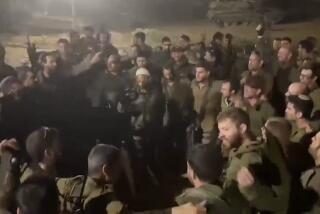On the Run and Issuing Orders
- Share via
BAGHDAD — Out of power and hunted by large numbers of U.S. forces, Saddam Hussein is still giving orders to Iraqis, telling them what to do with such seemingly minor things as looted property and government cars, if a new audiotape aired Friday is authentic.
In the rambling audio recording, said to have been made Sunday, the taped voice told Iraqis they could keep looted cars or sell them without any fear of repercussions once he returns to power. But it warned that those who handed cars over to the occupiers would be treated as traitors.
“We consider those cars as gifts to those who hold them. They have full freedom to do what they want with them.... They will not face any kind of legal questioning,” said the recording, aired on Al Jazeera television.
“However, in all cases, we prohibit the people concerned to hand over their cars to the criminal occupiers or their traitor aides.”
For Iraqis who have grown used to life without Hussein, even for those bitter about the difficulties of the U.S.-led occupation, the tape seemed almost surreal in its denial of reality.
Mohammed Najar, a 46-year-old interior decorator in Baghdad, was flabbergasted: “He doesn’t exist! How can he be issuing us these instructions? It’s unbelievable!
“He’s making a joke of himself.”
But even as many Iraqis dismissed Hussein, some rejected the U.S.-led occupation with even angrier rhetoric. And the tape appeared designed to play to that fury.
The voice on the tape predicted that the occupation of Iraq could collapse at any moment.
“We are quite convinced that the moment of collapse for the occupying army, and their admission of reality, and of what God and the people desire, is ... a possible and approaching reality at any moment.”
Though many Iraqis brushed aside the relevance of the recording, it did underscore how important it is for U.S.-led forces to capture or kill the former dictator to bring a sense of finality to his regime.
Last week, in the wake of the killings of Hussein’s sons and the capture of several of his close associates, U.S. military officials were expressing confidence that the former president’s capture was imminent. Now, however, they’re playing those expectations down.
On Thursday, Lt. Gen. Ricardo Sanchez, the commander of ground forces in Iraq, scoffed at a comment by Deputy Secretary of State Richard L. Armitage that the U.S. was just hours behind Hussein.
“You’ve not heard me say that,” he said. “I’m the guy on the ground that’s running these operations and that’s not what the intelligence says, you know.”
Still, the pursuit continued Friday in Hussein’s hometown of Tikrit, where U.S. forces captured two men who were associates of the former president, a military official told Associated Press. He did not identify the captives.
Another U.S. soldier died Friday after being shot the day before in Baghdad, U.S. Central Command said.
The soldier, whose name was not immediately released, was hit by a bullet fired by an Iraqi celebrating something, the command said.
U.S. officials have begun to speculate about why Hussein has limited himself to tape recordings and not used a video to send a stronger message.
“You have to wonder why he’s not on video. Is he just cowering in a corner so no one has a hint of where he is, or is he injured or disfigured?” said a senior U.S. official in Washington. “It’s rather odd, and it sort of shows how low he has fallen.”
Interviews with Iraqis after the tape aired Friday indicate that the former dictator still raises powerful emotions -- as does the U.S.-led occupation.
Men who discoursed thoughtfully about Hussein’s irrelevance said they would consider taking up arms to fight U.S. soldiers unless things improve.
Najar, the interior decorator, said he is waiting for a religious fatwa, or order, to resist the occupation, and then he would take up arms.
A student, Haidar Munder, 18, described the taped comments as “useless” and Hussein as “finished.” But he said that American mistakes, including problems with electricity and kerosene supplies, had boosted Hussein.
Fordos Jarbar, 50, a homemaker, said she had to turn the television off after a few words because it brought back memories of the execution of her brother in 1983.
“Whenever I hear his voice, I remember we suffered very much,” she said.
Emire Jomaa, 40, another homemaker, said: “I can’t believe he is quite finished. Maybe he could come back. We still fear him.”
Most of those interviewed believe that eventually American forces will capture or kill Hussein.
Yousef Ali Ahmad, 34, a juice shop owner, predicted that the former president would shoot himself before surrendering. In any case, Ahmad said, Friday’s taped message forced him to concede respect for Hussein on one score: “For his courage. He does indeed have courage.”
*
Times staff writer Robin Wright in Washington contributed to this report.
*
(BEGIN TEXT OF INFOBOX)
Imagining Hussein the Fugitive
To help coalition forces in Iraq recognize Saddam Hussein if they run across him, the U.S. Central Command has distributed copies of these altered photos of the deposed dictator that try to show how he might look if he has changed his appearance in the last few months. Coalition forces have been searching for Hussein since the start of the war in March. The photo alterations mark the latest move by Central Command to intensify the hunt for the former president since soldiers killed his sons Uday and Qusai last week.
More to Read
Sign up for Essential California
The most important California stories and recommendations in your inbox every morning.
You may occasionally receive promotional content from the Los Angeles Times.













